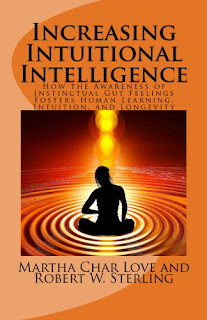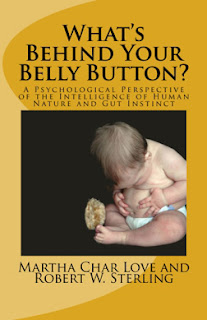How do we know when our gut feelings are reliable? Is there a way to distinguish trustworthy intuitions from irrational feelings and biases? These are questions that we see people frequently pondering in blog posts and one that my colleague Robert Sterling and I have studied for some time in ourselves and many others in career and personal counseling.
Irrational feelings are our emotions, not the feelings in our guts, although unfortunately often confused. Let me explain briefly the difference between emotions and gut feelings, because I think this is a key to the question of how we know when our gut feelings are reliable:
1. Emotions are generally felt above the gut, above the hara, and are a combination of feeling from the gut and thinking from the head, i.e. fear, a combination of emptiness in gut feeling combined with a projection from the head as to a specified threat.
2. Gut feelings, felt in the hara, have no thinking component like emotions do; gut feelings are pure feeling of emptiness or fullness and they are the source of all feeling in emotions.
3. Gut feelings are pure feeling and relate to the state of the human organism.
4. Gut feelings are your truth, so to speak, related to how well your needs for acceptance and for feeling in control of your own responses to life/freedom is being met, and they are in that way always reliable.
It can take quite a bit of reflection on our gut feelings to begin to understand this, to see this in your own experience, particularly if one is not use to exploring feelings and distinguishing the difference in emotions and gut feelings. But just like it is so important to understand the difference in thinking and feeling to increase our EI, our emotional intelligence, it is important to take the time to understand the difference in emotional feelings and gut feelings to further increase our intelligence and facility that we may like to call "Intuition". So, we may have increased our "EI" by understanding the difference in our thinking and feelings or emotions, but let's go further and increase our "Intuitive Intelligence" by understanding and reflecting upon the difference in our emotional feelings and gut feelings.
1. Emotions are generally felt above the gut, above the hara, and are a combination of feeling from the gut and thinking from the head, i.e. fear, a combination of emptiness in gut feeling combined with a projection from the head as to a specified threat.
2. Gut feelings, felt in the hara, have no thinking component like emotions do; gut feelings are pure feeling of emptiness or fullness and they are the source of all feeling in emotions.
3. Gut feelings are pure feeling and relate to the state of the human organism.
4. Gut feelings are your truth, so to speak, related to how well your needs for acceptance and for feeling in control of your own responses to life/freedom is being met, and they are in that way always reliable.
It can take quite a bit of reflection on our gut feelings to begin to understand this, to see this in your own experience, particularly if one is not use to exploring feelings and distinguishing the difference in emotions and gut feelings. But just like it is so important to understand the difference in thinking and feeling to increase our EI, our emotional intelligence, it is important to take the time to understand the difference in emotional feelings and gut feelings to further increase our intelligence and facility that we may like to call "Intuition". So, we may have increased our "EI" by understanding the difference in our thinking and feelings or emotions, but let's go further and increase our "Intuitive Intelligence" by understanding and reflecting upon the difference in our emotional feelings and gut feelings.
This brings up another important question about gut feelings. “What role should intuitive thinking play in important decision making? And how can we train ourselves to have better knowledge of our gut instincts?”
We need to explore our gut instincts, not just use them with some vague idea of what they are. One really has to "know Thyself" and take the effort to do that inner work to use their gut feelings successfully in decision-making. There is much more to our gut instincts than just "pattern recognition brain impressions", although these patterns are certainly a result of our gut intelligence combined with our thinking—and rather it is accurate thinking or not depends upon whether we use our gut feelings as a premise of our thinking or leave out the impact of experience upon us and marginalize our human needs as unimportant to consider in problem-solving. This all effects the accuracy and haze in these mental patterns and our ability to have and increase Intuitive Intelligence. If we use our thinking as a premise for our logic without grounding it in our gut feelings, we run the risk of following a system of thought coming from an external source that may have no relevance to our life experience and may not take our human needs in consideration.
Have you ever felt like you were out on a limb trying to follow someone else's ideas of what you should be doing, even someone you carry in your head and haven't seen for a long time? We have to reflect on our gut feelings to separate out the thinking in our heads that comes from someone else's view of us, perhaps a view we picked up so long ago that we have forgotten when we first thought it or where it really came from. Successful people stop and reflect and listen to their own inner gut feelings and needs and take those into consideration in their goal setting and actions. When your thinking and feelings in your body are united, you feel confident and like you are standing on solid ground. This is also a condition that reduces stress and brings on good health, as well as intuitive and creative thinking.
This is not to say that all people who are having some success in a career are feeling full and a sense of wholeness. One can be successful and come to a place when the activities they have chosen in a career no longer serve them. We once had a person come to us for counseling that had been quite successful for a long time in his field, but the acceptance he got for doing a good job no longer served his needs and he realized that he needed to make a change. Here is an excerpt from our book What's Behind Your Belly Button? on pages 87-88 about this experience. We include this because it demonstrates how success is both an external and internal experience and requires gut feeling awareness for a reliable decision:
"We once had a patient who was a
renowned stain glass artist in his locality. While extremely successful both
artistically and economically, he expressed that he was so very empty from his
work. And upon reflection on his feelings, he found that he had begun his
career early in life and was so rewarded positively by his family that he kept
doing it, even though he was not fulfilled on an instinctive gut feeling level
by his work. Marrying and having children only added to his pressure to succeed
in a career and it seemed to make it all the more impossible for him to stop a
successful career as a stain glass artist. At the time we saw him, he was and
had been working for years in a career that emptied him and he had never found
the opportunity to stop his work and make a career change, although he now
desperately wanted to do so. He was beginning to experience medical symptoms
that he intuitively felt related to working in a career that he wanted to walk
away from. Yet he was frightened to make a career change and somewhat frozen in
his effort to do so. Upon reflection on his feelings, we were able to trace his
fear of leaving the career back to early childhood demands upon his performance
from his well-meaning parents.
"After several sessions, he was able to
understand the source of his fear of change, gain the awareness of his true
instinctual needs, and then make a career change into a business field he
choose that was more truly satisfying for him. And he was able to use his
knowledge of the field of art in his new business of buying and selling art and
this continuity was quite fulfilling for him [as well as quite profitable]. And by the way, the last time we
heard from him after his career change, we understand that he does voluntarily
still make stain glass, but on a limited bases that fits his own inner need
time-schedule of production rather than outer demands for performance success."
We have found as counselors, researchers, and educators over 40 plus years on this subject of gut feelings that people find that their intuition and healthy decision-making increases exponentially with somatic reflection on the awareness of one's gut feelings. For this reason, we have created the Somatic Reflection Process that you can read about and find the complete protocol for in our book What's Behind Your Belly Button? by Martha Char Love and Robert W. Sterling available though Amazon on both the Amazon USA and Amazon UK.
Click on a book cover below to go to Amazon to Buy:
"Increasing Intuitional Intelligence" is available on Amazon USA and Amazon UK
If
you are on the homepage of this blog, click word "comment" directly
below to see all comments and make one yourself! If you are on the
webpage for this post, then simply post in the box provided below.





